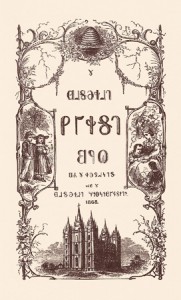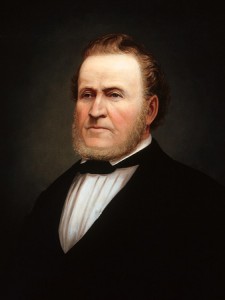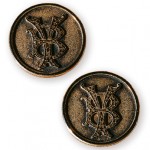By Brigham Young
Editor’s Note:
As Brigham Young University celebrates the 200th anniversary of its founder’s birth, BYU Magazine presents a sampling of the prophet’s teachings on education. Included here are excerpts from speeches given by Brigham Young between 1853 and 1874, retaining the spelling, punctuation, and capitalization used in the Journal of Discourses (JD, 26 vols., London: Latter-day Saints’ Book Depot, 1854–86).


THE PRINCIPLE OF IMPROVEMENT
Delivered in the Tabernacle, Great Salt Lake City, Feb. 6, 1853 (JD 2:91).
In the experience of our lives we are taught many principles that are worthy the attention of the most intelligent on earth. The first great principle that ought to occupy the attention of mankind, that should be understood by the child and the adult, and which is the main spring of all action, (whether people understand it or not,) is the principle of improvement. The principle of increase, of exaltation, of adding to that we already possess, is the grand moving principle and cause of the actions of the children of men. No matter what their pursuits are, in what nation they were born, with what people they have been associated, what religion they profess, or what politics they hold, this is the main spring of the actions of the people, embracing all the powers necessary in performing the duties of life.
This is the lesson we should study. The powers of our minds and bodies should be governed and controlled in that way that will secure to us an eternal increase. While the inhabitants of the earth are bestowing all their ability, both mental and physical, upon perishable objects, those who profess to be Latter-day Saints, who have the privilege of receiving and understanding the principles of the holy Gospel, are in duty bound to study and find out, and put in practice in their lives, those principles that are calculated to endure, and that tend to a continual increase in this, and in the world to come. All their earthly avocations should be framed upon this principle. This alone can insure to them an exaltation; this is the starting point, in this existence, to an endless progression. All the ideas, cogitations, and labors of man are circumscribed by and incorporated in this great principle of life.
PRECEPT UPON PRECEPT
Delivered in the Tabernacle, Great Salt Lake City, Jan. 26, 1862 (JD 9:167).
I do not know that I have ever spoken to the Saints upon any principle of the Gospel of salvation when I could do more than offer a few opening remarks, there is so much to learn. The oldest and most experienced persons in this Church are satisfied that they have by no means learned all that is to be learned concerning things that pertain to this world. To even thoroughly learn all the different branches of mechanism is more than one man can do in this mortal life. The object of this existence is to learn, which we can only do a little at a time. “Whom shall he teach knowledge? And whom shall he make to understand doctrine? Those that are weaned from the milk and drawn from the breasts. For precept must be upon precept, precept upon precept; line upon line, line upon line; here a little and there a little.”
How gladly would we understand every principle pertaining to science and art, and become thoroughly acquainted with every intricate operation of nature, and with all the chemical changes that are constantly going on around us! How delightful this would be, and what a boundless field of truth and power is open for us to explore! We are only just approaching the shores of the vast ocean of information that pertains to this physical world, to say nothing of that which pertains to the heavens, to angels and celestial beings, to the place of their habitation, to the manner of their life, and their progress to still higher degrees of perfection.
We hear many glorious truths in the discourses delivered by our Elders here and in other places, but we return to our homes and to-morrow we are about as we were yesterday. It is our privilege to improve each day of our lives, but can we improve fast enough to even gain all the knowledge that pertains to this world in the life we now possess? No; but we can gain knowledge faster than we now do, by exercising still greater diligence.
IN TIME AND ETERNITY
Delivered in the Tabernacle, Great Salt Lake City, Feb. 17, 1856 (JD 3:202–3).
The extent of knowledge, incorporated within the salvation extended to the children of men, will vastly exceed the researches of the human family, and when they have passed the veil, they will then understand that they have but just commenced to learn. Brother Morley says he never expects to be too old to learn; I believe that doctrine. That which is to be learned in the eternities of the Gods pertains to life, and that life is exhibited to the human family in the degree which they are capacitated to receive it, that they may be taught as we teach our children, that they may learn the first rudiments of eternal lives.
Could we live to the age of Methuselah, and eat the fruits which the earth would produce in her strength, as did Adam and Eve before the transgression, and spend our lives in searching after the principles of eternal life, we would find, when one eternity had passed to us, that we had been but children thus far, babies just commencing to learn the things which pertains to the eternities of the Gods.
We might ask, when shall we cease to learn? I will give you my opinion about it; never, never. If we continue to learn all that we can, pertaining to the salvation which is purchased and presented to us through the Son of God, is there a time when a person will cease to learn? Yes, when he has sinned against God the Father, Jesus Christ the Son, and the Holy Ghost—God’s minister; when he has denied the Lord, defied Him and committed the sin that in the Bible is termed the unpardonable sin—the sin against the Holy Ghost. That is the time when a person will cease to learn, and from that time forth, will descend in ignorance, forgetting that which they formerly knew, and decreasing until they return to the native element, whether it be one thousand or in one million years, or during as many eternities as you can count. They will cease to increase, but must decrease, until they return to the native element. These are the only characters who will ever cease to learn, both in time and eternity.
PLUCK FRUIT FROM THE TREE OF KNOWLEDGE

Delivered in the Bowery, Great Salt Lake City, Aug. 31, 1862 (JD 9:369–370).
We should seek substantial information, and trust little to that kind of so-called learning that is based entirely upon theory. We should pluck fruit from the tree of knowledge, and taste, then shall our eyes be open to see, our ears to hear and our hearts to understand. I would recommend the same course to those who have not embraced and tasted the sweets of “Mormonism.” We should get wisdom by reading and by study. We should introduce the best books into our schools for the education and improvement of our children. Let our school teachers seek constantly to fasten upon the young mind useful information, and banish from their schools every study that only tends to perplex the student and waste his valuable time. . . .
After introducing into our schools every useful branch of education, let our teachers ask the Father, in the name of Jesus, to bestow upon them and upon their scholars the Spirit of wisdom and intelligence from heaven; ask for skill to control and ability to teach on the part of the teacher, and willingness to be controlled and aptability to be taught on the part of the scholars. Let parents aid the teacher in his labours, by seeing that their children attend school punctually, with a proper supply of books, slates, pencils, &c.; and permit not a good, diligent, faithful school-teacher to suffer for the common necessaries of life, while he is labouring to educate and bless their children.
Every good and perfect gift cometh from God. Every discovery in science and art, that is really true and useful to mankind, has been given by direct revelation from God, though but few acknowledge it. It has been given with a view to prepare the way for the ultimate triumph of truth, and the redemption of the earth from the power of sin and Satan. We should take advantage of all these great discoveries, the accumulated wisdom of ages, and give to our children the benefit of every branch of useful knowledge, to prepare them to step forward and efficiently do their part in the great work.
Endless variety is stamped upon the works of God’s hands. There are no two productions of nature, whether animal, vegetable or mineral, that are exactly alike, and all are crowned with a degree of polish and perfection that cannot be obtained by ignorant man in his most exquisite mechanical productions. Man’s machinery makes things alike; God’s machinery gives to things which appear alike a pleasing difference. Fields and mountains, trees and flowers, and all that fly, swim or move upon the ground are lessons for study in the great school our Heavenly Father has instituted for the benefit of his children. Let us explore this great field of information that is open before us in good books and in the great laboratory of nature.
TEACH LESSONS OF BEAUTY AND USEFULNESS
Delivered in the meetinghouse in Nephi, Utah, April 18, 1874 (JD 17:45).
Then let there be good teachers in the school rooms; and have beautiful gardens, and take the little folks out and show them the beautiful flowers, and teach them in their childhood the names and properties of every flower and plant, teaching them to understand which are astringent, which cathartic; this is useful for coloring, that is celebrated for its combination of beautiful colors, &c. Teach them lessons of beauty and usefulness while they are young, instead of letting them play in the dirt, making mud balls, and drawing the mud in their hats, and soiling their dresses, and cultivate their mental powers from childhood up. When they are old enough, place within their reach the advantages and benefits of a scientific education. Let them study the formations of the earth, the organization of the human system, and other sciences; such a system of mental culture and discipline in early years is of incalculable benefit to its possessor in mature years. Take, for instance, the young ladies now before me, as well as the young men, and form a class in geology, in chemistry or mineralogy; and do not confine their studies to theory only, but let them put in practice what they learn from books, by defining the nature of the soil, the composition or decomposition of a rock, how the earth was formed, its probable age, and so forth. All these are problems which science attempts to solve, although some of the views of our great scholars are undoubtedly very speculative. In the study of the sciences I have named, our young folks will learn how it is that, in traveling in our mountains, we frequently see sea shells—shells of the oyster, clam, &c. Ask our boys and girls now to explain these things, and they are not able to do so; but establish classes for the study of the sciences, and they will become acquainted with the various facts they furnish in regard to the condition of the earth. It is the duty of the Latter-day Saints, according to the revelations, to give their children the best education that can be procured, both from the books of the world and the revelations of the Lord. If our young men will study the sciences, they will stop riding fast horses through the streets, and other folly and nonsense which they are now guilty of, and they will become useful and honorable members of the community.
BY THE SPIRIT OF GOD
Delivered in the New Tabernacle, Salt Lake City, May 3, 1874 (JD 17:51–56).
It is nearly time to close this meeting, but I desire to speak a few words. I have very much that I wish to convey to the Latter-day Saints, but I can only say, in as few words as possible, a little at a time, upon a few subjects which I wish to lay before the Saints. First, looking upon the Latter-day Saints, the inquiry within myself is—Do you know whether I am leading you right or not? Do you know whether I dictate you right or not? Do you know whether the wisdom and the mind of the Lord are dispensed to you correctly or not? These are questions which I will answer by quoting a little Scripture, and saying to the Latter-day Saints what was said to the Saints in former times, “No man knoweth the things of God, but by the Spirit of God.” That was said in the days of the Savior and the Apostles, and it was no more true then than it is now, or than it was in the days of the Prophets, Moses, Abraham, Noah, Enoch, Adam, or in any and every age of the world. It requires the same manifestations in one age as in another, to enable men to understand the things of God. I have a request to make of each and every Latter-day Saint, or those who profess to be, to so live that the Spirit of the Lord will whisper to them and teach them the truth, and define to their understanding the difference between truth and error, light and darkness, the things of God and the things that are not of God. In this there is safety; without this there is danger, imminent danger; and my exhortation to the Latter-day Saints is—Live your religion.
Among all intelligent beings upon the earth there is a great mistake in regard to dispensing to others the knowledge they possess. . . .

We wish to know a great deal, and do not want our neighbors to know as much as we do, but wish them to believe that we know it all. This trait of character is very common, both here and through the whole world. We all wish to know something that our neighbors do not know. With scientific men you will often find the same trait of character: “My studies and my researches are beyond those of my neighbors; I know more than they know; I treasure this up to myself, and I am looked upon as a superior being, and that delights me.”
I say to the Latter-day Saints, and to all the world, this is all wrong. We are here upon this earth as the children of our heavenly Father, who is filled with light and intelligence, and he dispenses that to his children as they can receive and profit by it, without money and without price. Is not this a fact? It is. Go to every department of life, to the mechanics, to the manufacturers, to those learned in all the arts and sciences, throughout the world, and not one of them possesses an item of knowledge or wisdom but what has come from God, the fountain of all wisdom and knowledge. The idea that the religion of Christ is one thing, and science is another, is a mistaken idea, for there is no true religion without true science, and consequently there is no true science without true religion. The fountain of knowledge dwells with God, and he dispenses it to his children as he pleases, and as they are prepared to receive it, consequently it swallows up and circumscribes all. This is the great plan of salvation; this is the “bugaboo” that the Christian world hoot at so much, and which they call “Mormonism”—it is the Gospel of life and salvation. . . .
I thank you for your attention, brethren and sisters. I have detained you a little longer than I intended to do. God bless you.
WEB: To honor the 200th birthday of its founder, BYU has planned various campus celebrations, from a Brigham Young lecture series to Homecoming festivities. For information about celebration events as well as details of Brigham Young’s life, see magazine.byu.edu/extras.












